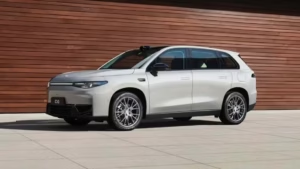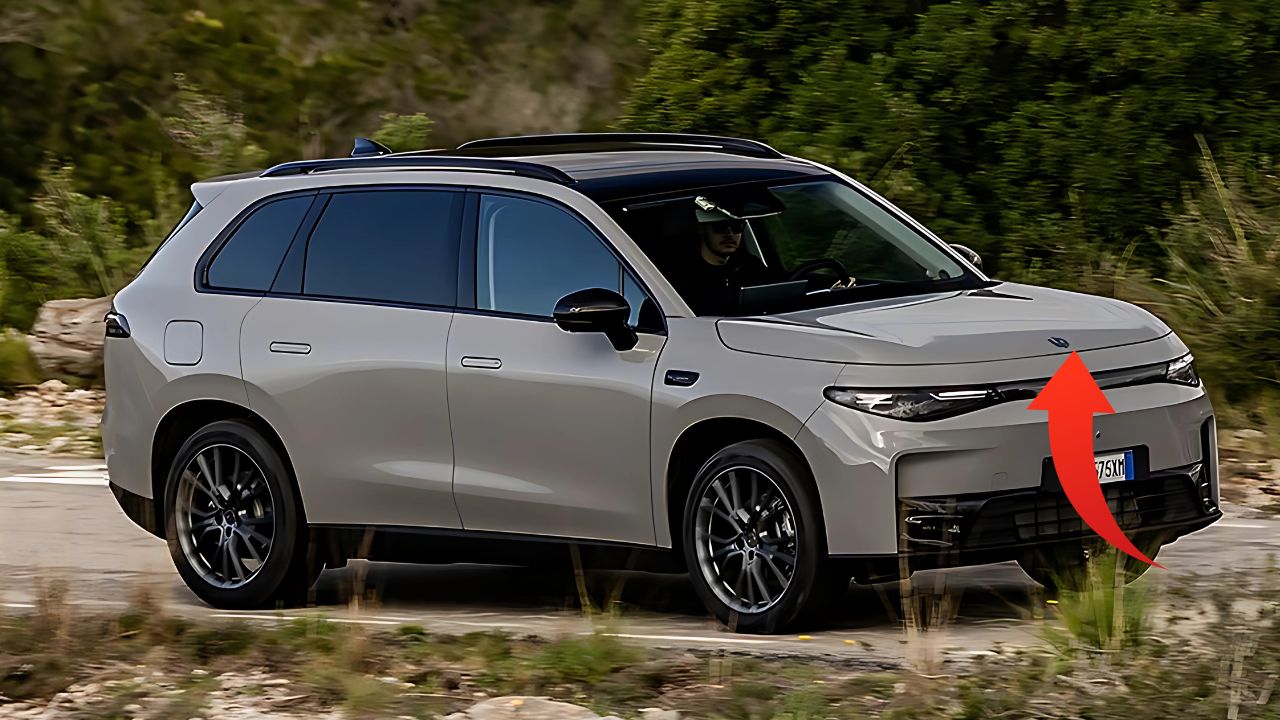The automotive landscape is experiencing a fascinating shift as consumers increasingly gravitate toward hybrid solutions over pure electric vehicles. Leading this charge is the impressive 2025 Leapmotor C10 REEV (Range Extended Electric Vehicle), which promises to revolutionize how we think about electrified transportation. With its strategic pricing and remarkable capabilities, this Chinese-engineered marvel appears poised to outsell its battery-electric counterpart, reinforcing the growing trend of hybrid dominance in the global automotive market.
Market Dynamics Favor Hybrid Technology
Recent sales data reveals a compelling story that challenges the notion of pure electric vehicle supremacy. While battery electric vehicles continue growing, hybrid vehicles are experiencing unprecedented momentum. In the United States alone, hybrid sales reached record-breaking levels in 2024’s third quarter, capturing 10.6% of the light-duty vehicle market compared to 8.9% for battery electrics.
This phenomenon isn’t confined to American shores. Across global markets, consumers are demonstrating clear preferences for vehicles that eliminate range anxiety while maintaining environmental consciousness. The practical benefits of hybrid technology – combining electric efficiency with gasoline reliability – resonate strongly with everyday drivers who demand flexibility without compromise.
The shift represents more than simple consumer preference; it reflects genuine concerns about charging infrastructure, travel patterns, and real-world usability. While pure electric vehicles excel in urban environments with robust charging networks, hybrid solutions provide universal accessibility regardless of location or infrastructure limitations.
Leapmotor C10 REEV: Engineering Excellence Meets Affordability
Revolutionary Range-Extender Technology
The 2025 Leapmotor C10 REEV showcases sophisticated engineering that distinguishes it from conventional hybrid systems. Unlike traditional hybrids where gasoline engines directly power the wheels, this advanced system employs a 1.5-liter four-cylinder engine exclusively as an electrical generator. The setup ensures drivers experience pure electric propulsion while benefiting from extended range capabilities.
This innovative approach delivers exceptional efficiency metrics. The vehicle achieves remarkable fuel consumption figures of just 0.9 liters per 100 kilometers, while producing minimal CO2 emissions of only 21 grams per kilometer. Such impressive statistics position the C10 REEV as an environmental champion without sacrificing practical utility.
The electric motor produces 158kW (215 horsepower), providing responsive acceleration and smooth operation characteristic of electric propulsion. Power flows from a carefully sized 28.4kWh battery pack, offering approximately 145 kilometers of pure electric driving before the range extender activates seamlessly.
Impressive Range Capabilities
Perhaps the most compelling feature distinguishing the C10 REEV from pure electric alternatives is its extraordinary total range. Combined electric and gasoline operation enables up to 1,150 kilometers of travel on a single charge and full tank – effectively eliminating range anxiety that continues plaguing pure electric vehicle adoption.
This extensive range capability transforms long-distance travel from a logistical challenge into effortless journey planning. Drivers can confidently embark on cross-country adventures without constantly monitoring charging station availability or adjusting routes to accommodate battery limitations.
The psychological impact cannot be understated. Knowing that fuel stations provide instant range restoration removes the stress associated with electric vehicle ownership, particularly for individuals frequently traveling beyond urban centers or those living in areas with limited charging infrastructure.
Competitive Pricing Strategy
Exceptional Value Proposition
Leapmotor has positioned the C10 REEV as an accessible entry point into electrified transportation. Starting at $45,900 drive-away in Australia, the vehicle undercuts its pure electric sibling by $1,600 while offering significantly enhanced practicality through extended range capabilities.
This pricing strategy reflects shrewd market understanding. By delivering hybrid technology at competitive rates, Leapmotor removes financial barriers that often deter consumers from considering electrified vehicles. The price point positions the C10 REEV favorably against established competitors like the Tesla Model Y, BYD Sealion 6, and various other mid-size SUV offerings.
The value proposition extends beyond initial purchase price. Reduced fuel consumption translates to ongoing operational savings, while the six-year warranty provides peace of mind typically associated with premium offerings. Additionally, the eight-year battery warranty demonstrates manufacturer confidence in long-term reliability.

Comprehensive Feature Set
Despite its aggressive pricing, the C10 REEV doesn’t compromise on amenities. Standard equipment includes advanced driver assistance systems, premium interior materials, and modern connectivity features. The panoramic glass roof with power sunshade creates an airy cabin atmosphere, while heated seats and dual-zone climate control ensure passenger comfort.
Safety technology encompasses adaptive cruise control, lane-keeping assistance, autonomous emergency braking, and comprehensive monitoring systems. These features, once exclusive to luxury vehicles, now come standard in this affordable hybrid SUV, democratizing advanced automotive technology.
Why Hybrids Are Winning Consumer Hearts
Practical Everyday Solutions
Consumer behavior research consistently reveals that practicality trumps ideological considerations when purchasing vehicles. While environmental consciousness motivates initial interest in electrified powertrains, real-world usability determines final purchase decisions. Hybrid vehicles like the C10 REEV address this dynamic perfectly.
The ability to drive electrically for daily commuting while maintaining gasoline backup for longer journeys satisfies diverse transportation needs within a single vehicle. Urban dwellers benefit from zero-emission city driving, while the gasoline range extender ensures rural adventures remain feasible without elaborate planning.
This versatility particularly appeals to families requiring reliable transportation for various scenarios. School runs, grocery shopping, and weekend getaways all become seamlessly manageable without range considerations that complicate pure electric vehicle ownership.
Infrastructure Independence
Perhaps the most significant advantage hybrid technology offers is infrastructure independence. While pure electric vehicles depend heavily on charging network availability and reliability, hybrids provide fallback options that eliminate anxiety associated with electrical system failures or inadequate charging facilities.
This independence proves especially valuable for individuals living in apartments, rental properties, or areas lacking home charging capabilities. Rather than navigating complex charging arrangements or relying entirely on public infrastructure, hybrid owners enjoy flexibility that matches traditional vehicle ownership patterns.
The psychological comfort of knowing gasoline stations provide instant range restoration cannot be overstated. This assurance enables spontaneous travel decisions and removes the careful planning required for pure electric vehicle journeys beyond familiar territories.
Market Trends Supporting Hybrid Growth
Global Sales Momentum
Statistical evidence strongly supports hybrid vehicle momentum across international markets. European sales data shows increasing hybrid adoption rates, with consumers appreciating the technology’s practical benefits over pure electric alternatives. Even in progressive markets like Norway, which achieved 88% electric vehicle penetration, hybrid options remain relevant for specific use cases.
American market trends particularly favor hybrid solutions. Recent quarterly data reveals hybrid sales growth consistently outpacing pure electric vehicle expansion, suggesting consumer preferences align more closely with hybrid versatility than pure electric limitations.
This pattern emerges despite substantial government incentives favoring pure electric vehicles, indicating genuine consumer preference rather than policy-driven adoption. The organic growth of hybrid sales demonstrates market demand for practical electrification solutions.
Manufacturer Strategic Shifts
Automotive manufacturers increasingly recognize hybrid technology’s market potential, evidenced by expanded hybrid lineups and reduced emphasis on pure electric exclusivity. Companies that initially pursued aggressive electric-only strategies are now introducing hybrid alternatives to capture broader market segments.
This strategic evolution reflects realistic assessment of consumer needs, infrastructure realities, and profitability considerations. Hybrid vehicles often provide better profit margins than heavily subsidized electric models while satisfying environmental regulations and consumer demands simultaneously.
Leapmotor’s approach exemplifies this trend, offering both pure electric and hybrid variants to address different consumer preferences. The anticipated sales performance of the C10 REEV over its electric sibling validates this comprehensive strategy.
Technical Innovation Driving Adoption
Advanced Powertrain Engineering
Modern hybrid systems like the C10 REEV’s range-extender technology represent significant engineering advancement over earlier hybrid implementations. The sophisticated integration of electric propulsion with gasoline generation creates seamless operation that rivals pure electric vehicles in daily driving while eliminating range limitations.
The system’s efficiency optimization ensures minimal fuel consumption during range-extended operation, maintaining environmental benefits while providing practical flexibility. Advanced engine management systems operate the gasoline unit only when necessary, preserving electric-only operation for maximum efficiency.
Regenerative braking technology captures energy typically lost during deceleration, contributing to overall system efficiency and extending electric-only range. This integration demonstrates how hybrid technology can match or exceed pure electric vehicle efficiency in real-world applications.
Smart Energy Management
Intelligent energy management systems automatically optimize power delivery based on driving conditions, battery state, and route requirements. Drivers can select various operating modes to prioritize electric operation, performance, or efficiency depending on specific needs.
This adaptability ensures optimal performance across diverse driving scenarios, from stop-and-go urban traffic ideal for electric operation to highway cruising where the range extender provides sustained power delivery. The seamless transitions between operating modes maintain the electric vehicle driving experience while ensuring unlimited range capability.
Future Outlook for Hybrid Dominance
Sustainable Market Position
Current market trends suggest hybrid technology will maintain strong positioning as the automotive industry continues electrification efforts. Rather than representing a temporary transition technology, modern hybrids like the C10 REEV offer permanent solutions addressing fundamental consumer needs that pure electric vehicles struggle to satisfy universally.
The combination of environmental benefits, practical utility, and economic accessibility creates compelling value propositions that resonate across diverse consumer segments. As infrastructure development continues gradually improving, hybrid vehicles provide immediate solutions without requiring systemic changes to transportation patterns.
Innovation Trajectory
Continued technological advancement promises even more capable hybrid systems in coming years. Battery technology improvements will extend electric-only ranges, while more efficient gasoline engines will further reduce emissions during range-extended operation.
Integration with smart charging systems and renewable energy sources will enhance environmental benefits, while advanced connectivity features will optimize energy management based on real-time traffic conditions and driver preferences. These developments will strengthen hybrid technology’s competitive position against pure electric alternatives.
Frequently Asked Questions
What makes the Leapmotor C10 REEV different from other hybrid vehicles?
The C10 REEV uses a unique range-extender system where the gasoline engine never directly powers the wheels, instead functioning purely as an electrical generator. This provides pure electric driving experience with extended range capability, unlike traditional hybrids where engines directly drive wheels.
How does the C10 REEV compare financially to pure electric vehicles?
The C10 REEV costs $1,600 less than equivalent electric variants while offering dramatically extended range and infrastructure independence. Lower fuel consumption provides ongoing operational savings, while reduced charging dependency eliminates costs associated with public charging networks.
Will hybrid vehicles eventually be replaced by pure electric cars?
Current market trends suggest hybrid technology will remain relevant long-term, addressing fundamental consumer needs around range, infrastructure, and flexibility that pure electric vehicles cannot universally satisfy. Rather than temporary solutions, modern hybrids represent permanent alternatives for specific use cases and consumer preferences.

